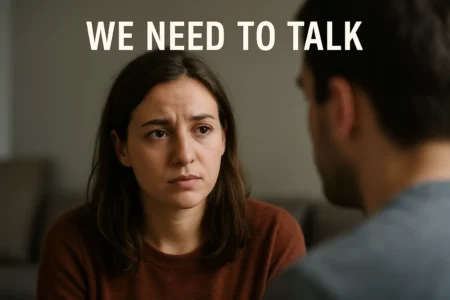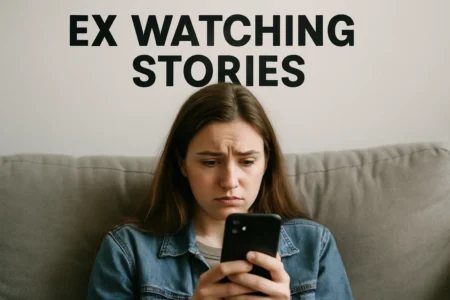The smell of garlic bread and Chianti. I can still conjure it like it was yesterday. I remember laughing, a full-throated, happy sound, thinking how perfect everything felt. How perfect we were. We were planning a trip for the fall, going back and forth between the crisp air of New England and the sunny coasts of California. It was all so normal. So wonderfully, beautifully normal. Then, somewhere between the main course and the tiramisu, his words cut through it all. “I don’t think I can do this anymore.” Just like that, the world stopped. The floor beneath my feet gave way. It was my blindsided breakup, a term I wouldn’t learn until later.
Back then, it was just a raw, physical shock that stole the air from my lungs and left an icy void. If you’re here, you probably know that feeling all too well. The vertigo. The betrayal. The dizzying loop of replaying every single memory, desperately searching for a clue you must have missed. A blindsided breakup isn’t just a split; it’s the demolition of your reality.
It forces you to question everything you thought you knew, especially yourself. This is for you. Think of this as a hand to hold in the dark. It’s a real, practical guide to surviving these first, brutal steps. We will walk through the initial shock, the tidal wave of emotions, and the very first things you can do to start reclaiming your own life. This isn’t about “getting over it.” Forget that. This is about getting through it. One breath at a time.
More in Connection & Dating Category
Key Takeaways
- This Isn’t a Normal Breakup; It’s Trauma: Your world was just turned upside down without warning. The intense pain and confusion you feel are not an overreaction; they are a valid response to a traumatic event.
- Your Only Job Right Now Is to Breathe: For the next day or two, survival is the only goal. Find a safe place, call one trusted person, and focus on your breathing. Don’t make any big decisions or try to get them back.
- Go No-Contact. Seriously: This is non-negotiable. Seeing their life unfold on social media is like picking at a wound. You need total distance to even begin healing.
- Feel Your Feelings (Don’t Fight Them): The anger, the sadness, the confusion—it’s all part of the process. Let it out. Journal, go for a run, have an ugly cry. Moving the emotion through your body is the only way out.
- You Have to Give Yourself Closure: You will likely never get the answers you desperately want from your ex. Healing means accepting that hard truth and finding closure on your own terms.
- Slowly, Gently, Find Yourself Again: This isn’t about becoming a new person. It’s about remembering who you were before the relationship and building a future that belongs entirely to you.
Wait, What Just Happened? Making Sense of the Initial Shock
Those first few moments are a complete blur. Your mind is scrambling, trying to find a reason, but there isn’t one. There’s just a crater where your future was supposed to be. This is pure, undiluted shock. Your body is flooded with adrenaline and cortisol, the same hormones that fuel your fight-or-flight response. That numb, out-of-body feeling? It’s a defense mechanism. It’s your system’s way of shielding you from a pain so overwhelming it feels like it could break you. So, if you feel like you’re losing your mind, trust me, you’re not. You’re having a sane reaction to an insane situation.
This wasn’t a gentle parting of ways. It was an earthquake. The ground you stood on has crumbled, so it’s completely natural to feel like you can’t trust anyone, least of all your own judgment. The most important thing you can do right now is be incredibly kind to yourself. You’ve been deeply wounded. The first step is just to sit with that fact, without any pressure to “be strong.”
Why Didn’t I See This Coming?
This is the question that will keep you up at night. You’ll become a detective of your own past, sifting through conversations and text messages for the sign you missed. The cruel reality of a blindsided breakup? There often isn’t a sign for you to see. While you were living in one reality, your partner was secretly living in another. They were wrestling with their decision, pulling away emotionally, and planning their exit while you were still planning your life together.
I did it, too. I replayed every quiet moment, every brief phone call. “Was that it? Was he thinking about it then?” This kind of thinking is a form of self-torture. In most cases, the person who leaves goes to great lengths to act like everything is fine. Maybe to avoid a fight, maybe because they’re a coward. They maintain the illusion, letting you keep investing, keep loving, keep believing in a future they’ve already decided to cancel. It’s a betrayal that cuts so much deeper than just the act of leaving. It wasn’t your job to read their mind. You didn’t miss the signs. The signs were hidden from you.
Is It Normal to Feel This Confused and Hurt?
Yes. It’s the only response that makes any sense. Imagine you’re building a house with someone. You pick out the paint colors, you argue about kitchen tiles, you dream about the garden you’ll plant. You believe you’re building it together. Then, one day, they show up with a bulldozer and tell you they never really wanted a house anyway, as the walls are coming down around you.
The pain is doubled. First, you have the standard, gut-wrenching grief of losing the person you love. But the blindsided breakup adds a twisted, second layer: the destruction of your own reality. The person you trusted most has just informed you that your shared life was a lie. That’s a mind-bending experience.
It makes you doubt your own sanity. I remember him holding my hand across the table at that dinner, celebrating a promotion I’d gotten. He had brought me flowers. He smiled. Thirty minutes later, he was a stranger telling me he’d been unhappy for a long, long time. The whiplash was unreal. How could both of those things be true? That confusion is the signature wound of being blindsided. It’s what makes this so uniquely agonizing.
Okay, I’m in Survival Mode. What Do I Do Right Now?
Forget about a five-year plan. Forget about figuring out how to trust again. Right now, you just need to get through the next five minutes. Then the next five after that. This is triage. This is putting on your own oxygen mask first. The urge to do something—to fix it, to bargain, to get answers—is going to be massive. But the most powerful thing you can do is resist that urge and simply survive the emotional storm.
Your brain isn’t working properly. It’s in crisis, which means complex decisions are out. So, simplify everything. Shrink your world down to the most basic, manageable tasks. Drink water. Take a shower. Put on clean clothes. These aren’t small things. They are radical acts of self-preservation. They are you, choosing to care for yourself, even when you feel like you’ve ceased to exist.
How Can I Just Get Through the Next 24 Hours?
The first day is a beast. The shock is a raw, physical ache. Here’s a simple checklist to help you survive it:
- Find a Safe Haven: If you live together, get out. Go to a friend’s place, your parents’ house, even a cheap hotel. You need a neutral zone where you can completely fall apart without their stuff staring you in the face.
- Make One Call: Don’t post about it. Don’t send out a group text. Call your one person—the friend who listens without judging, who won’t immediately start telling you what to do. Just get the words out: “We broke up. I’m not okay.”
- Just Breathe: When you feel panic rising in your chest, stop and focus on your breath. In for four counts, hold for four, out for six. It feels silly, but it sends a direct message to your nervous system that you are safe, even when your heart is telling you otherwise.
- Fuel Your Body: You won’t want to eat. Do it anyway. A smoothie, toast, soup—anything. Your body is under an incredible amount of stress, and it needs energy. Drink so much water.
- No Big Decisions: Promise yourself you won’t do anything drastic for at least 48 hours. No rash decisions about your job or apartment. Just be still.
Should I Beg Them to Come Back?
The urge will feel like a physical force, a scream in your throat. Your mind will race, convinced that if you can just find the perfect words, you can reverse this. You can make them see they’re making a huge mistake.
Please, hear me on this: Do not do it. Begging won’t work. By the time someone blindsides you, their decision has been cooking for weeks, maybe months. Your pleas will be met with pity or frustration, not a change of heart. More importantly, every time you beg, you chip away at your own dignity. It reinforces the idea that you need them to be whole. You have to cling to your self-respect like a life raft right now. It is one of the only things that will get you through this. Letting them walk away is the first, most agonizing, and most necessary step you can take.
My Brain is Spinning. How Do I Handle the Overwhelming Thoughts?
After the numbness of shock fades, the mental chaos begins. Your brain, desperate for answers, will go into overdrive. It will replay everything on a loop. This is rumination, and it feels like being trapped in a room with your worst critic. You can’t just force the thoughts to stop; that never works. The trick is to learn how to manage them, to let them flow past without letting them drown you.
This is a time for active, conscious effort. You are literally retraining your brain to focus on your own healing in the present moment, not a past that’s already gone. It takes incredible patience. It takes a lot of self-compassion. Some days will be brutal. On those days, remind yourself that the obsessive thoughts are a symptom of the trauma. They aren’t you.
What Should I Do With All This Anger and Pain?
First, let it in. The fury, the deep, gutting sadness, all of it. Our world is uncomfortable with messy emotions and rushes people to “look on the bright side.” That’s nonsense. You have every right to be furious. You have every right to be shattered. These feelings aren’t the problem; suppressing them is. Pushing them down just means they’ll come out sideways later.
You have to get the energy out. Go for a punishing run. Scream into a pillow. Blast the saddest music you can find and have a full-on, ugly cry. Write a long, blistering letter to your ex. Don’t hold back. Fill it with every angry, confused, and heartbroken thought in your head. Then, and this is the most important part, do not send it. Burn it. Delete it. The point isn’t to get a reaction from them; it’s to get the poison out of you.
How Do I Stop Obsessing Over What Went Wrong?
The “why” loop is maddening. Your brain needs a reason, an explanation for the catastrophe. When it doesn’t have one, it will turn on you, blaming you for everything. Was I not enough? Did I push too hard? Was it that stupid thing I said two months ago? This self-interrogation is a dead end.
You will probably never get a straight answer from your ex. If they give you reasons, they’re usually watered-down clichés designed to make them feel better. You have to make the choice to stop looking for answers from an unreliable source. Closure isn’t something they can give you. It’s something you have to find for yourself. Try this: give yourself 15 minutes a day to obsess. Set a timer. Go wild. When the timer goes off, you’re done for the day. If the thoughts creep back in, gently tell yourself, “Not now. We can worry about this tomorrow at 7 PM.” It sounds strange, but it can help you contain the chaos.
The World Feels Hostile. How Do I Manage My Environment?
Suddenly, everything is a landmine. A song on the radio. A street corner. The ping of a text message. The world, which once felt like your playground, now feels like a battlefield of memories. Taking control of your environment is a crucial step in creating a safe space to heal. This isn’t about hiding forever. It’s about intentionally curating your physical and digital world to support your recovery. It’s about reducing the daily barrage of emotional gut-punches.
Think of it as self-defense for your heart. You are protecting a raw wound from infection. Blocking a number or boxing up photos might feel extreme, but they are necessary acts of boundary-setting. You are telling yourself that your well-being is now the number one priority.
Do I Really Have to Block Them on Social Media?
Yes. Absolutely, one hundred percent, yes. It is so tempting to keep that little window into their life open. You tell yourself you’re just curious. But you’re not. You’re looking for proof that they’re miserable without you. And you will almost certainly find the opposite.
Months after my breakup, I broke my own rule. I looked. And there it was: a photo of him, on the very trip we had planned, with a new woman. The pain was so sharp and so immediate it felt like day one all over again. I literally threw my phone. That was the moment I understood: you cannot heal your life while you are watching theirs. Block them. Mute their friends. Do whatever it takes to create a clean break. It is one of the kindest things you will do for your future self.
What About Our Mutual Friends and Shared Places?
This is tough. For now, lean on the friends who are 100% yours. You need safe people. With mutual friends, you don’t need to create drama, but you do need to set a boundary. A simple, “Hey, I love you, but for my own sanity, I can’t hear about my ex right now. Can we please not talk about them?” A real friend will get it.
The same goes for places. That cafe, that park, that bar? It’s okay to avoid them for a while. You’re not being a coward; you’re protecting your peace. Eventually, the charge will fade. One day, you’ll be able to go back and create a new memory there. But for now? It’s okay to find new favorites. Let this be a time to build a new map of your city, one that belongs only to you.
I Feel So Alone. How Can I Start Reconnecting With Myself?
A blindsided breakup doesn’t just disconnect you from a partner; it disconnects you from yourself. Your identity gets so tangled up in being a “we” that when it’s gone, you can feel erased. The journey back isn’t about inventing a “new you.” It’s about remembering the person who was always there, underneath the relationship. It’s about rediscovering what makes you tick.
It feels weird at first. You might feel like you’re just going through the motions. That’s fine. The goal isn’t instant joy; it’s gentle rediscovery. You’re taking small steps back to your own center, and with each step, you rebuild the trust in yourself that was shattered. You begin to prove to yourself that your happiness was never actually in their hands.
Who Was I Before This Relationship?
Think about it. What did you love to do before you were a “we”? Did you paint? Did you love hiking? Did you get lost in bookstores? We all set aside little pieces of ourselves in a partnership. It’s time to go pick them up again. Make a list. You don’t have to tackle it all at once. Just pick one thing and do it.
It might feel lonely. The first time I went to a movie alone after he left, I was painfully aware of the empty seat next to me. But then, about halfway through, I was so caught up in the film that I forgot to be sad for a few minutes. It was a tiny victory, but it was everything. That’s how it starts. With small acts of independence. You are actively showing yourself that your life can still be rich and full.
Can I Learn Anything From This Pain?
It sounds impossible now, but this experience can be a catalyst for profound personal growth. This idea is backed by science; psychologists call it post-traumatic growth. Extensive research has shown that navigating profound adversity can lead people to develop a deeper appreciation for life, stronger relationships, and a powerful sense of their own strength. As detailed by UC Berkeley’s Greater Good Science Center, trauma can become a turning point.
This doesn’t mean you should be thankful for the pain. It means your pain doesn’t have to be for nothing. One day, you will look back and see the resilience you forged, the compassion you gained, and the rock-solid boundaries you learned to enforce. My own moment came a year later.
I was on a solo hike, something I hadn’t done in years. I got to the top, breathing hard, and looked out at the world. For the first time, I felt a deep, quiet peace that had nothing to do with anyone else. I realized the breakup, as brutal as it was, had forced me to build a life that was truly, authentically mine. This pain will change you. You get to decide how.
Moving Forward Feels Impossible. What Do the Next Steps Really Look Like?
Healing isn’t a straight line. It’s messy. You’ll have a great week, feel like you’re finally turning a corner, and then a song or a memory will knock you right back on your butt. That’s not a failure; it’s part of the process. The goal isn’t to get to a place where you never feel sad. The goal is for the sadness to become a visitor that shows up less often and doesn’t stay as long. Moving forward is about learning to carry this experience as a part of your story, not as the entire story.
It’s about integrating the lessons without getting stuck in the past. It’s about continuing to choose yourself, over and over again. It’s about trusting that even on the days you can’t feel it, you are walking toward a brighter place.
How Long Is This Going to Hurt?
There’s no magic answer here. It will hurt for as long as it hurts. Anyone who gives you a timeline or tells you to “get over it” is someone to ignore. Healing from this kind of shock takes time. It might be months. It might be a year or more. It depends on the length of the relationship, your support system, and how committed you are to doing the hard work of healing.
So, stop watching the clock. Instead, look for progress. Are you having more good moments this month than last month? Did you go a whole day without a painful memory loop? Those are the real victories. Be patient with yourself. Grief isn’t a race to the finish.
When Will I Know I’m Truly Healing?
You’ll know. It won’t be a lightning bolt. It’ll be a quiet sunrise. It’s the moment you hear that song you shared and you just sing along. It’s the day you realize you’ve gone hours, maybe even a whole day, without thinking of them. You’ll know you’re healing when you start to feel a genuine spark of excitement for your own future, a future you’re now in complete control of.
The clearest sign of all is when you can think about what happened with a sense of peace. You might always carry a little scar, a hint of sadness for what you thought you had, but it won’t be a bleeding wound anymore. It will be a reminder of what you survived. The pain will soften, and what will be left is the wisdom, the strength, and the undeniable truth that you are strong enough to get through anything. And you will.
FAQ – Blindsided Breakup

How can I rebuild my sense of self and find closure after a blindsided breakup?
Reconnect with your interests and activities you loved before the relationship. Rediscover who you are by engaging in solo activities and practicing independence, which helps rebuild trust in yourself and provides natural closure.
What are effective ways to deal with anger and pain without causing further harm to myself?
Allow yourself to fully feel your emotions without suppression. Express them through activities like crying, writing, or physical exercise. Write a detailed letter to your ex to release your anger, but do not send it, and instead burn or delete it.
How should I handle the overwhelming thoughts and obsessive replaying of memories?
Manage obsessive thoughts by setting specific times, like 15 minutes a day, for reflection. Practice mindfulness to focus on the present and remind yourself that these thoughts are symptoms of trauma, not your identity.
Why is it important to go no-contact after a sudden breakup, and how does it aid healing?
Going no-contact helps to prevent the pain from social media and mutual connections from reopening wounds. It creates space for emotional healing by removing constant reminders of your ex and allowing you to focus on yourself.





